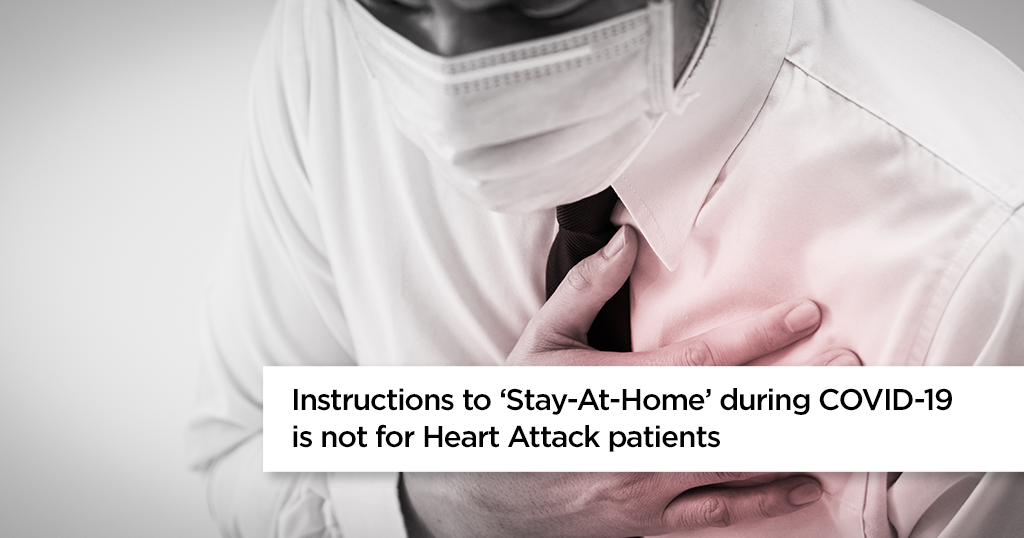Overview
People experiencing heart attacks must immediately call the emergency services – even during the COVID-19 outbreak. Guidelines urging you to ‘stay-at-home’ is not for patients with heart attack symptoms. Every minute counts during a heart attack. There are specific, lifesaving treatments for heart attacks. However, the treatment needs to be administered quickly and in the most effective manner. Delaying treatment not only increases the damage to your heart and raises the risk of developing heart failure, but can put lives at risk.
What is a Heart Attack?
Heart Attack, also called MI (Myocardial Infarction), occurs when an artery (blood vessel) supplying blood and oxygen to the heart becomes blocked due to gradual build-up of cholesterol, fat and other substances that form plaque. Plaque eventually breaks away to form clots interrupting the blood flow. The resulting loss of blood flow damages the heart muscle.
A heart attack can be life-threatening. However, there has been a marked improvement in its treatment over the years. Nevertheless, it’s very important to seek emergency medical help if you think you or your loved ones might be having a heart attack.
Risk Factors for a Heart Attack
Known risk factors of a heart attack include:
- Obesity
- High cholesterol
- High blood pressure
- Diabetes
- Sedentary (inactive) lifestyle
Some non-modifiable factors can also be responsible for a heart attack. They include:
- Age
- Gender
- Family history
Common Heart Attack Symptoms
While heart attack symptoms vary by gender, not all heart attacks are same. It may not always involve chest pain. There may be uneasiness or discomfort or a feeling of pressure on the chest. Some common heart attack symptoms in are
- Mild discomfort/pain in chest that comes and goes (also called ‘stuttering’ chest pain)
- Discomfort/pain in arm, shoulder, elbow and jaw
- Sweating
- Shortness of breath
- Dizziness and nausea
- Severe Anxiety or Confusion
Symptoms may vary between individuals. Some may have very mild or no symptoms at all and may suffer a ‘silent heart attack.’
Heart Attack Symptoms in Men
Men are likely to have heart attacks earlier in life compared to women. In addition, history of cigarette smoking or family history of heart disease, obesity, high blood cholesterol, high blood pressure, or other risk factors, further increases the chances of having a heart attack in men. Symptoms of Heart Attack in men may include:
- Chest pain/pressure with squeezing sensation which may come and go, or remains constant
- Intense upper body pain/discomfort that radiates to the neck, jaw, or left arm, left shoulder or stomach
- Nausea, indigestion, heartburn or stomach pain
- Irregular or rapid heartbeat
- Shortness of breath
- Dizziness or feeling light-headed
- Breaking out in cold sweat
Heart Attack Symptoms in Women
Recent studies from scientists show that heart attack symptoms can be quite different for women compared to men. Typical heart attack symptoms in women include:
- Pain/discomfort in the neck, jaw, shoulder, upper back or abdomen
- Shortness of breath
- Pressure/pain in the center of chest that may spread to arm
- Anxiety
- Nausea or vomiting
- Lightheadedness or dizziness
- Sudden severe fatigue or unusual fatigue lasting several days
- Indigestion or gas-like pain
Symptoms in Women Above 50 Years
Women experience major physical changes around age 50, as this the time most of them start to go through menopause. After menopause, a woman’s risk of heart attack increases. Therefore, women have to be more conscious of their heart health after menopause. Women above 50 have additional symptoms of a heart attack. These symptoms include:
- severe chest pain
- pain/discomfort in one or both arms, in the neck, back, jaw or stomach
- Rapid or irregular heartbeat
- Sweating
The Bottom Line
Keeping a regular tab on the symptoms will surely give you a clue if your heart is under an attack. But, during the COVID-19 outbreak, many people with heart attack symptoms are avoiding or delaying going to hospital for fear of getting COVID-19 infection. Do not ignore heart attack symptoms because every minute counts.
Apollo Hospitals follows stringent patient-safety precautions inside the hospitals to prevent the spread of COVID-19 infection. Your life matters. If you or your loved ones have heart attack symptoms, dial 1066, Apollo Hospitals emergency helpline or rush to the nearest Apollo Hospitals because, we know how to save you and can do so very rapidly and effectively.


















